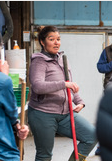Fishermen are Industrial Athletes Too
by Brie Weisman, Occupational Therapist
Also published by Commercial Fisheries News May 2022
“Industrial Athlete”, a relatively recent term, refers to workers in physically demanding jobs outside of sports. Being on your feet all day, doing physically demanding work while being exposed to weather, and keeping your balance on a boat requires prowess, strength, and stamina, and qualifies commercial fishermen as industrial athletes.
Recently, pro athletes have shifted away from the mindset of “toughing it out”, and now have the goal of maintaining high performance. That means resting injuries completely to achieve faster recoveries to peak performance.
Of course, avoiding injuries is a better goal. That means considering everything from strength training to nutrition, to stress management. As a result, athletes are injured less and are able to perform at or near peak levels longer in their careers.
Industrial athletes, like commercial fishermen, can learn from this trend.
- Prepare pre-season, train in-season. Strength training and stretching improves performance, reduces injuries, makes work more enjoyable, and leaves you with more energy at the day’s end.
- Rethink “toughing out” injuries. Is two days off really worse than two weeks of hobbling about? Taking time off for an injury not only speeds recovery, it often creates a long term net gain in productivity.
- Take advantage of specialists. Physicians and personal trainers cater exercises to your needs. Occupational therapists recommend modifications to your work practices. Getting advice on nutrition, stress management, and better health can help you stay or return you to optimum health and peak performance.
Pro sports teams are discovering that prematurely wearing out athletes’ bodies is bad for the bottom line. Is it right for you? Remember, it’s the only body you’ll get.
Cynthia Flores, owner of Labor-Movement, LLC, is a personal trainer and functional movement specialist focusing on movement patterns and strength of industrial athletes.
What do personal trainers do?
Personal trainers work with people of all fitness levels to help them gain strength, or learn, relearn, or fine tune movement patterns. We coach and assist with training plans to meet specific goals.
You were a farmer. How do you relate to fishermen?
Both are physically demanding jobs that lead to various aches, pains and potential injuries from repetitive movements. When I had pain farming, I altered the way I moved, often inappropriately, in order to get the work done. I didn’t think about how it was affecting my body.
As a personal trainer, what do you see fishermen and farmers having in common?
There are a lot of complaints about hips, low back, shoulders and neck–very predictable musculoskeletal injuries.
What is the most challenging part of your job?
Not finding time for myself. I’m just starting to lift again to prepare for a Strongwoman Competition.
What Is the best part of your job?
I enjoy caregiving and watching people get stronger. And I get to meet a lot of cool people who are doing cool things.
What is the biggest error people make with weight training?
If you’re cherry-picking the lifts you like, your strength gains will be harder to come by. Switch it up!
What is your favorite piece of equipment?
I have two: the kettlebell, for ballistic moves and unilateral training, and the dowel, for cueing clients about spine alignment in movement patterning.

